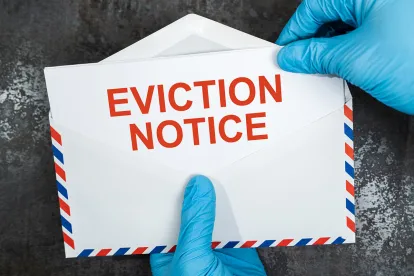On September 1, 2020, the United States Department of Health and Human Services through the Center for Disease Control and Prevention (CDC) announced it was issuing a nationwide order temporarily halting certain residential evictions. (Order). The Order became effective beginning September 4, 2020 through the end of 2020. Landlords will now need to review and comply with this new Order in addition to ongoing CARES Act restrictions and state and local regulation of evictions and landlord-tenant relations.
Previously the federal government passed a limited eviction moratorium under the CARES Act which was predicated on a landlord’s receipt of some benefit, direct or indirect, from the federal government. This benefit took the form of either (i) participation or receipt of rental income through federal housing programs (e.g., “Section 8” housing or low-income housing tax credit participants) or (ii) having a mortgage guaranteed by a governmental entity like Fannie Mae or Freddie Mac. This new moratorium has a broader application.
Under the Order, landlords may not evict a “covered person” from any residential property in any U.S. state or territory. The Order defines a “covered person” as “any tenant, lessee, or resident of a residential property who provides to their landlord, the owner of the residential property, or other person with a legal right to pursue eviction or a possessory action, a declaration under penalty of perjury” stating each of the following statements is true:
-
the individual has used best efforts to obtain all available government assistance for rent or housing;
-
the individual either (i) expects to earn no more than $99,000 in annual income for Calendar Year 2020 (or no more than $198,000 if filing a joint tax return), (ii) was not required to report any income in 2019 to the U.S. Internal Revenue Service, or (iii) received an Economic Impact Payment (stimulus check) pursuant to Section 2201 of the CARES Act;
-
the individual is unable to pay the full rent or make a full housing payment due to substantial loss of household income, loss of compensable hours of work or wages, a lay-off, or extraordinary out-of-pocket medical expenses;
-
the individual is using best efforts to make timely partial payments that are as close to the full payment as the individual’s circumstances may permit, taking into account other nondiscretionary expenses; and
-
eviction would likely render the individual homeless—or force the individual to move into and live in close quarters in a new congregate or shared living setting—because the individual has no other available housing options.
The Order clarifies that a tenant or other adult resident must affirmatively invoke the protections afforded under the Order by providing to their landlord a signed copy of the declaration form set out in the Order reciting the statements above (or a substantially similar declaration under penalty of perjury) to their landlord. The tenant protections are not self-operating. Based on the language of the Order, the commencement of such protection appears to apply merely upon the tenant’s provision of the declaration, not whether those statements are substantially true. Any tenant that makes a false or misleading statement or omission will be subject to civil and criminal penalties.
While a landlord may have recourse against a tenant in such a situation by later seeking civil damages or referring the matter to law enforcement as a result of a false or misleading statement made by a tenant, the eviction prohibition under the Order would seem to have been invoked. And given the inherent ambiguity in the term “best efforts,” and also the criminal penalties set forth for landlord noncompliance (discussed below), landlords will need to be especially cautious in contemplating proceeding with an eviction based on a theory that the tenant provided a declaration containing materially false statements and therefore the Order’s moratorium was not appropriately invoked.
The Order provides five specific exclusions allowing certain evictions to proceed based on the tenant or resident:
-
engaging in criminal activity while on the premises;
-
threatening the health or safety of other residents;
-
damaging or posing an immediate and significant risk of damage to property;
-
violating any applicable building code, health ordinance, or similar regulation relating to health and safety; or
-
violating any other contractual obligation, other than the timely payment of rent or similar housing-related payment (including non-payment or late payment of fees, penalties, or interest).
The fifth and final exclusion appears to effectively limit the moratorium protection to cover only evictions based on a failure to timely pay rent or other charges. On its face, this exclusion would seem to allow landlords to provide notices of non-renewals for month-to-month tenancies or other tenancies whose terms are set to expire before the end of the year. There is at least some concern that evicting a tenant based on failure to comply with a notice of termination by non-renewal could be prohibited if the tenant is already behind on rent (or perhaps if the Landlord seeks damages for past-due rent in the eviction action). It’s unclear whether a court would inquire into the unstated and subjective reasons of the landlord for not renewing a lease or terminating a month-to-month lease or it would review only the stated purpose of the notice of termination or notice not to renew. It’s imperative for landlords to tread cautiously in such a situation and seek qualified legal advice before taking action.
Notably, the Order contains no specific prohibition against landlords delivering notices to terminate tenancies (unlike under the CARES Act moratorium). The Order prohibits “eviction” defined as “any action by a landlord . . . to remove or cause the removal of a covered person from a residential property.” When combined with the language in the Order stating that no obligation to pay rent is affected by the Order, this may provide landlords—at least in Wisconsin—with an avenue to negotiate with tenants by seeking their voluntary removal. While the ability to evict the tenant has been temporarily extinguished for failure to pay rent, a landlord may still be able to terminate the tenancy, but not file an action for eviction. Under the provisions of Wis. Stat. § 704.27, a landlord could therefore be entitled to minimum damages set at twice the daily rent for each day that a tenant remains in possession of the premises after termination. This may provide some leverage in negotiation for some landlords.
Finally, to ensure compliance, the CDC recites that criminal penalties are established for violating the Order. These penalties for individuals violating the Order include “a fine of no more than $100,000 if the violation does not result in a death or one year in jail, or both, or a fine of no more than $250,000 if the violation results in a death or one year in jail, or both, or as otherwise provided by law.” The penalty for an organization violating the Order include “a fine of no more than $200,000 per event if the violation does not result in a death or $500,000 per event if the violation results in a death or as otherwise provided by law.”
It remains to be seen whether complementary aid will be forthcoming to alleviate the likely financial burden the Order’s eviction moratorium may create for landlords and property owners. In the meantime, landlords need to continue to carefully review and comply with the increasingly complex and web of local, state, and federal orders, rules, regulations, and statutes that bear on landlord-tenant relationships during the ongoing pandemic. Landlords are strongly encouraged to seek qualified legal advice tailored to the facts of each specific matter given the continually changing legal landscape and the uncertainties arising from the interplay between federal eviction moratoriums and state and local regulation.





 />i
/>i

